This Summer, My Beach Bag Is Filled to the Brim With Spray Sunscreens
Next-gen drops smell delicious and are never, ever sticky.

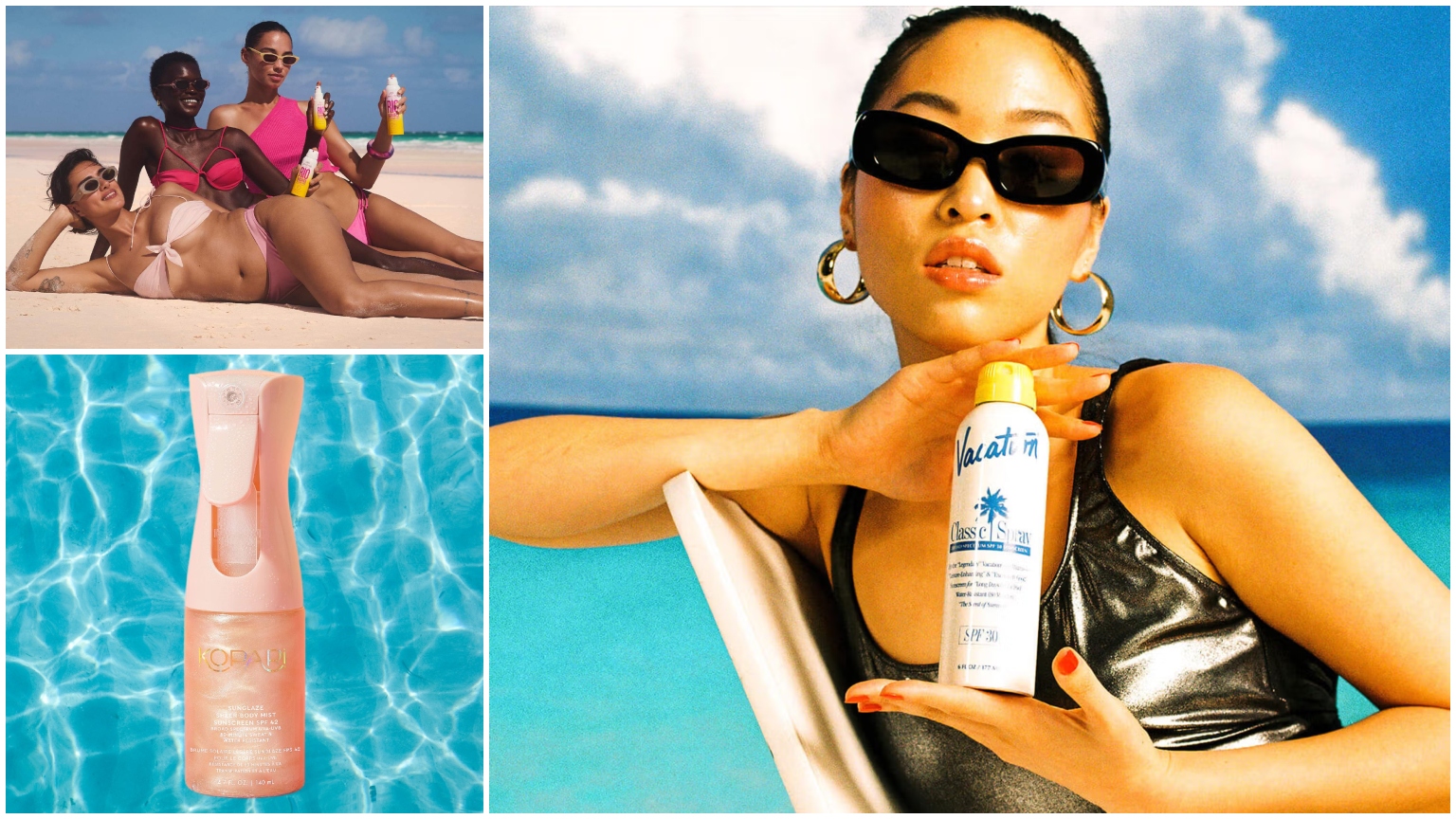
Select the newsletters you’d like to receive. Then, add your email to sign up.
You are now subscribed
Your newsletter sign-up was successful
Want to add more newsletters?

Delivered daily
Marie Claire Daily
Get exclusive access to fashion and beauty trends, hot-off-the-press celebrity news, and more.

Sent weekly on Saturday
Marie Claire Self Checkout
Exclusive access to expert shopping and styling advice from Nikki Ogunnaike, Marie Claire's editor-in-chief.

Once a week
Maire Claire Face Forward
Insider tips and recommendations for skin, hair, makeup, nails and more from Hannah Baxter, Marie Claire's beauty director.

Once a week
Livingetc
Your shortcut to the now and the next in contemporary home decoration, from designing a fashion-forward kitchen to decoding color schemes, and the latest interiors trends.

Delivered Daily
Homes & Gardens
The ultimate interior design resource from the world's leading experts - discover inspiring decorating ideas, color scheming know-how, garden inspiration and shopping expertise.
I could write a dissertation about the best sunscreen formulas in my sleep. SPF is my holy grail, my can’t-live-without, my must-have. I’ve tried dozens upon dozens of formulas—hi, tinted SPFs, Korean sunscreens, body sunscreens—through the years, and I’m confident that there’s nothing as quick, easy, and convenient to apply as one of the best spray sunscreens. Whether I need to reapply sunscreen over makeup or want a non-sticky full-body mist to use on the beach, a super-fine SPF spray is always going to be my MVP.
The convenience can’t be beat, and while a spray can be just as effective as a cream sunscreen formula, it’s important to take a little extra caution during application to avoid bizarre tanning patterns (been there, done that, not cute) or sunburn. The recipe for success? Hold the bottle no more than six inches away from your body and thoroughly rub everything into the skin. As for the face? Start with a cream formula (mineral or chemical will do) and reach for a facial-friendly spray SPF for reapplication.
To get a crash course in all things spray sunscreen, I strongly encourage you to keep reading. Not only have I rounded up some of my personal favorite products, but I also tapped board-certified dermatologists Lindsey Zubritsky, M.D., and Hadley King, M.D., to get their top application and safety tips. From fine mists with a barely-there feel to makeup setting sprays loaded with SPF, here’s a definitive guide to the best spray sunscreens.
The Best Spray Sunscreens
- Best Spray Sunscreen Overall: Kopari Beauty Sunglaze Sheer Body Mist Sunscreen SPF 42
- Best-Smelling Spray Sunscreen: Coola Clear Sunscreen Spray in Guava Mango SPF 50
- Best New Spray Sunscreen: Sol de Janeiro Rio Radiance SPF 50
- Best Mineral Sunscreen Spray: The Seaweed Bath Co. Clear Moisture Mineral SPF 30
- Best Spray Sunscreen for Face: Oars + Alps Face & Scalp Sunscreen Spray Mist SPF 35
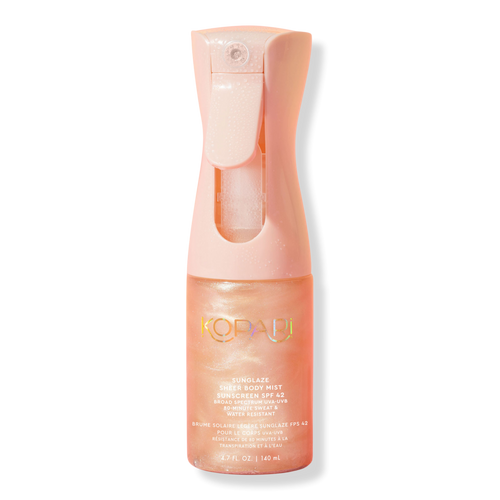
When I picture sexy summer skin, I imagine a hydrated, soft, and radiant complexion—and with this SPF, you get all three. The formula contains antioxidants vitamin E (for protection against free radicals) and vitamin C (for skin-brightening benefits), alongside hyaluronic acid, which works to draw moisture in for a hydrated, plump effect. But the cherry on top is the fine shimmer that leaves the most stunning sheen on your skin.
What I Love: Non-aerosol mist that has a continuous spray; Shimmer looks glowy not glittery; Dries down to an ultra-hydrating, non-sticky texture
What I Don't: Testers note that it spilled when placed in their bags while traveling
SPF: 42
Type: Chemical
Broad Spectrum Protection? Yes
Review for MC: "This SPF gives me the most stunning mermaid-like skin ever. I absolutely love the sheen it leaves behind because it's never too much—my skin just looks like a veil of glow. It also dries down to a hydrating, not greasy finish." — Siena Gagliano, Beauty Editor
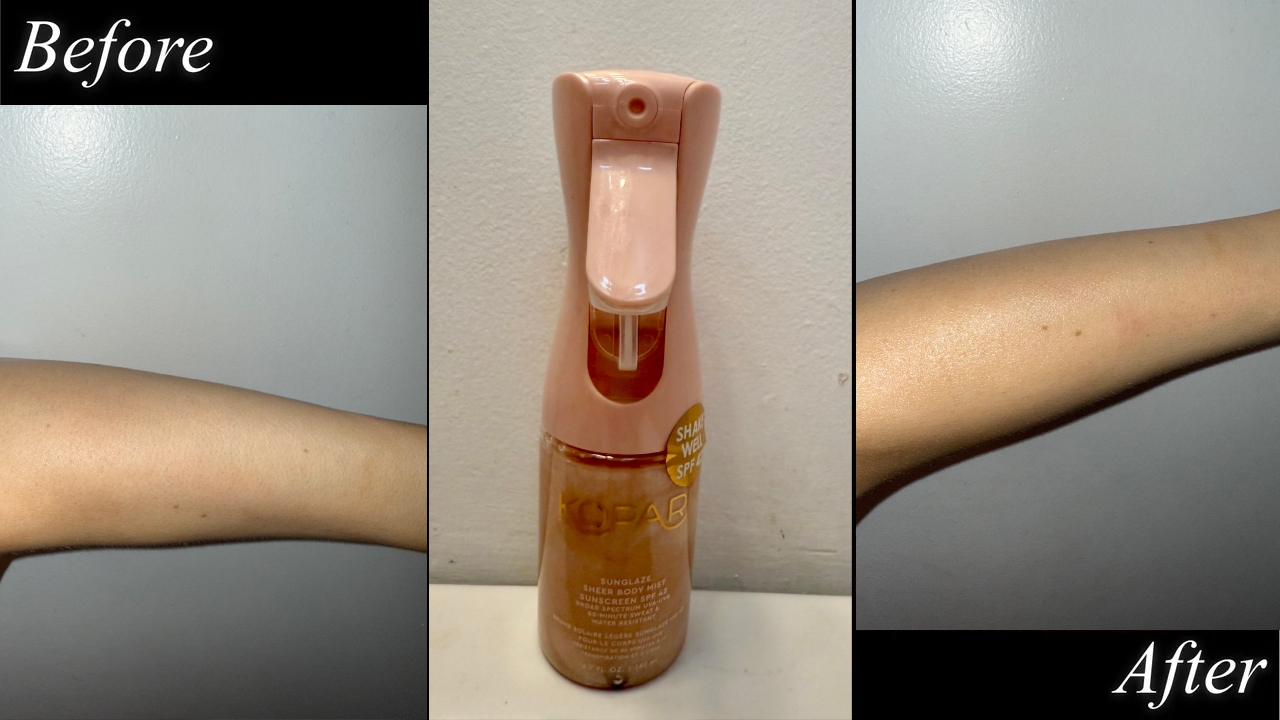
Siena Gagliano applies the Kopari Sunglaze Sheer Body Mist Sunscreen SPF 42 to her arm.
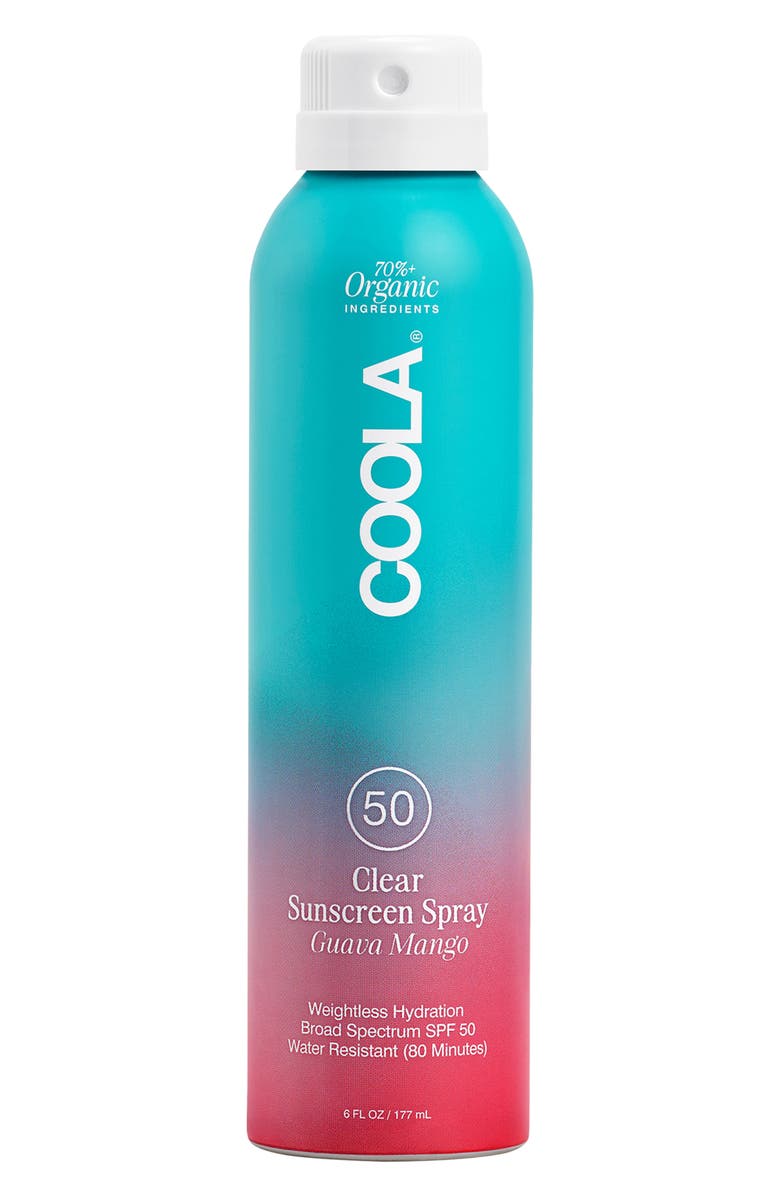
The latest and greatest in suncare innovation? SPF that smells like anything but SPF. Coola is a brand that does it well, offering four different scents—guava mango, as pictured, tropical coconut, peach blossom, and piña colada—with varying SPF protections. Each iteration smells like the yummiest beachside treat, and the texture is never sticky and always hydrating—the latter thanks to a plant-based antioxidant and oil blend.
What I Love: Non-aerosol; 90 minutes of water-resistance; Only natural fragrances, not synthetic
What I Don't: The scent is typically only apparent when applying
SPF: 50
Type: Chemical
Broad Spectrum Protection? Yes
Review for MC: "I look forward to applying this formula just to smell the delicious scent of tropical fruit. It's also a non-aerosol SPF, so it won't cause harm smelling it, FYI. It also has an impressive 90 minutes of water-resistance, which is great on beach days." — Siena Gagliano, Beauty Editor
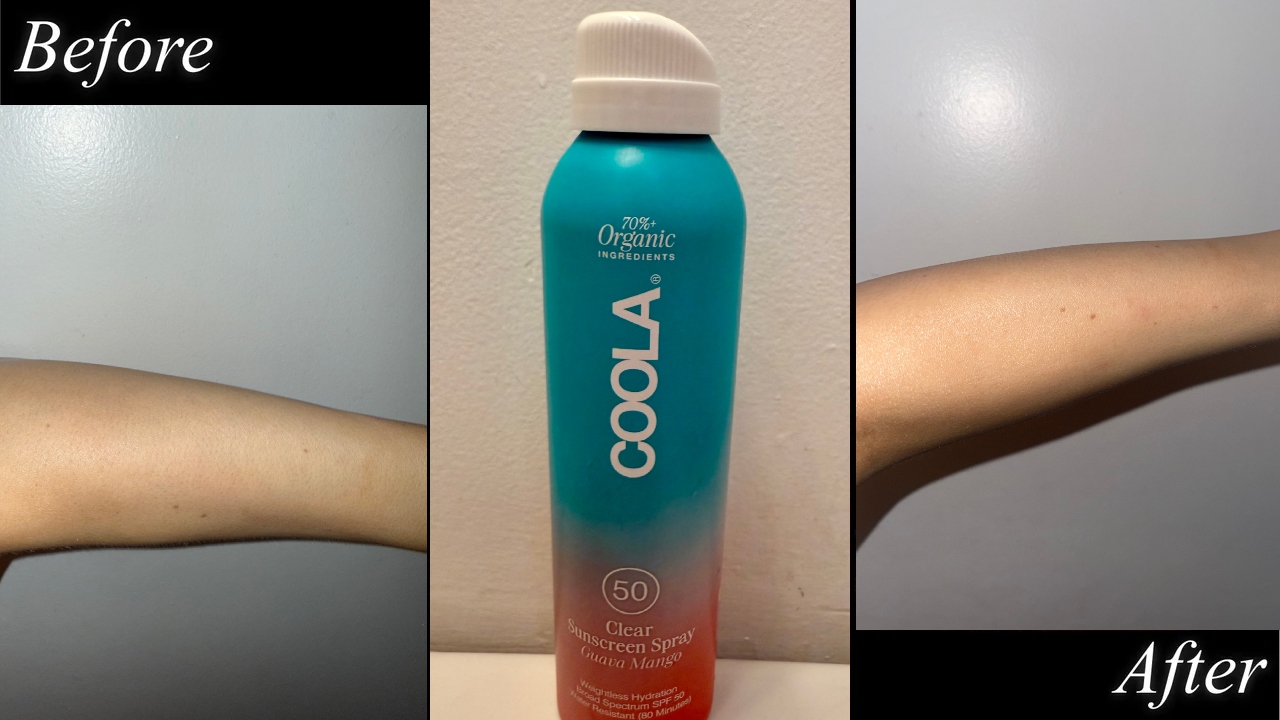
Siena Gagliano applies the COOLA Clear Sunscreen Spray in Guava Mango SPF 50 to her arm.
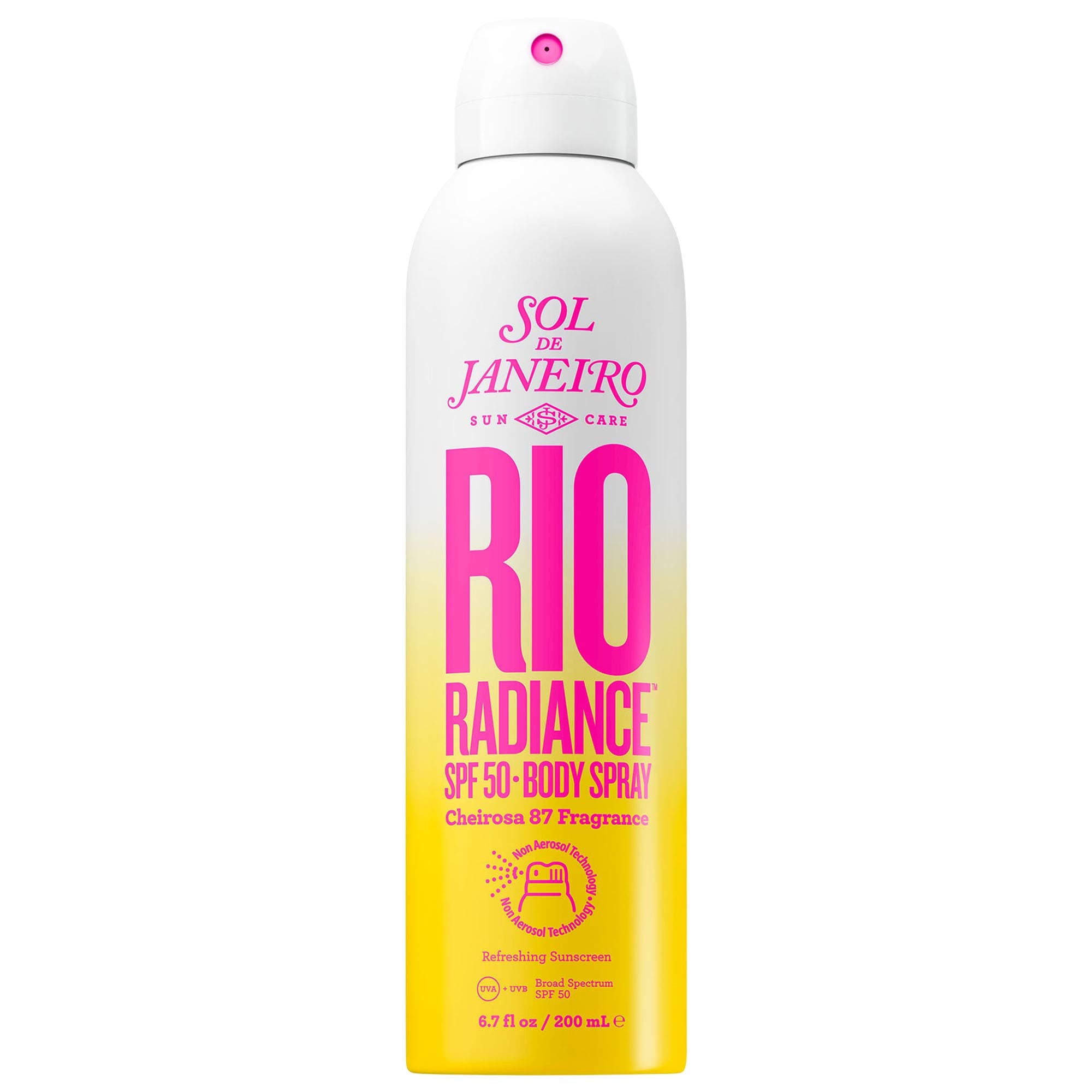
If you associate the Brazilian skincare brand, Sol de Janeiro, with anything, it's soft, smooth, delicious-smelling skin. Couple that with UV protection and a radiant finish, and you get the Rio Radiance SPF Spray. Not only does it look like a glass veil when applied, but it also contains niacinamide, which is a superstar when it comes to evening skin tone.
What I Love: Non-aerosol spray; Niacinamide is an active that evens and brightens skin tone
What I Don't: Not water-resistant
SPF: 50
Type: Chemical
Broad Spectrum Protection? Yes
Review for MC: "Sol de Janeiro is one of those brands I gravitate to in the summer for its incredibly moisturizing results and yummy-smelling formulas. When it launched a spray SPF with its signature scent, I was all ears. It performs like the rest of the brand's products, which, in my book, is always a win." — Siena Gagliano, Beauty Editor
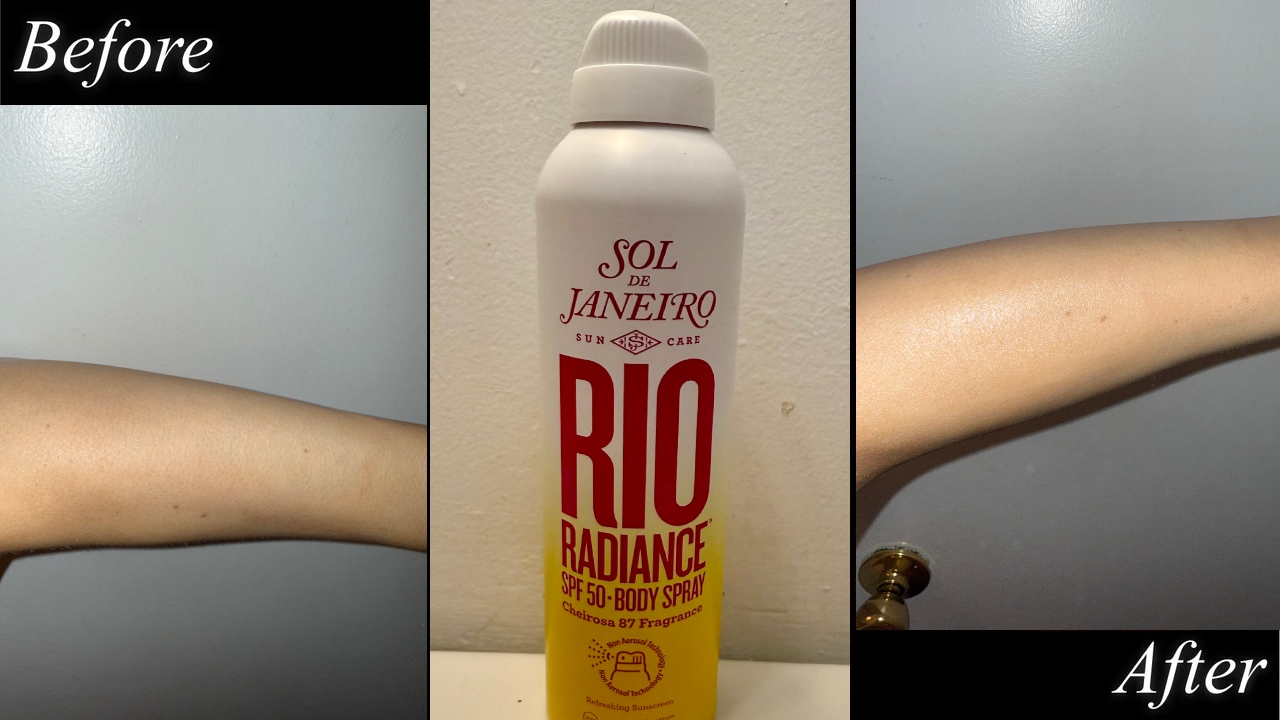
Siena Gagliano applies the Sol de Janeiro Rio Radiance SPF 50 to her arm.
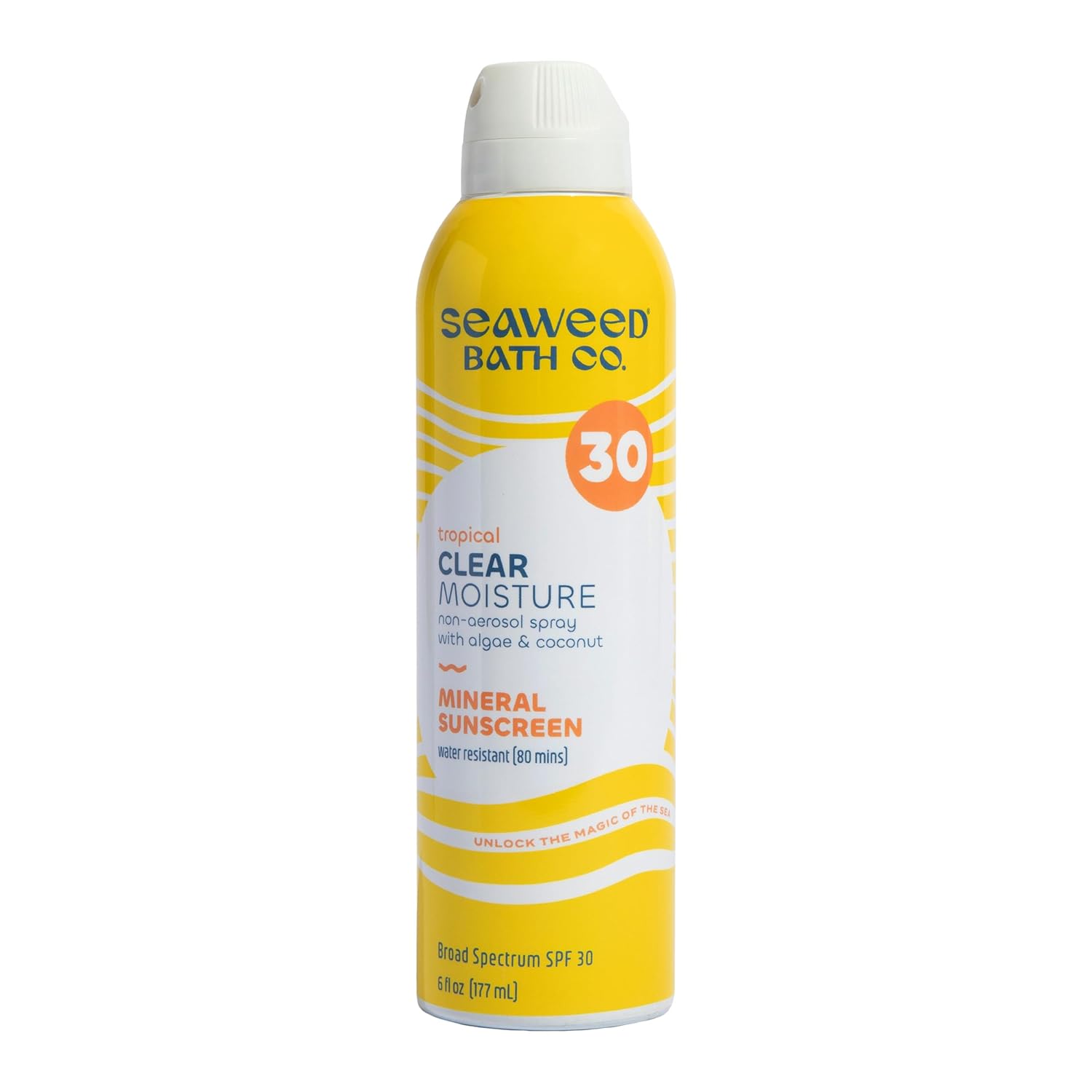
A mineral sunscreen is a great option for those with sensitive skin, and this formula combines a 100 percent zinc-based SPF with soothing and hydrating antioxidants like aloe and algae for a formula that feels as good on your skin as it is for your skin. Mineral sunscreens also start working as soon as they are applied, so rest assured you're not racking up any extra minutes of added sun exposure. Bonus: The Clear Moisture Mineral SPF contains a tropical scent featuring notes of melon, fresh grass, and neroli.
What I Love: Non-aerosol spray; 100 percent zinc oxide-based; Contains a slew of antioxidants
What I Don't: Will apply with a white cast until fully rubbed in
SPF: 30
Type: Mineral
Broad Spectrum Protection? Yes
Customer Review: "I used it when I visited some friends at the beach and it protected my skin all day! I reapplied every couple hours like I do with every sunscreen and didn't have any issues with burning and my skin didn't look ghost-white like with other mineral sunscreens. It goes on easily, you just need to firmly press on the spray and apply in sweeping motions. I love that I get the benefit of both types of sunscreen in one product. My new go-to this summer!" — Amazon
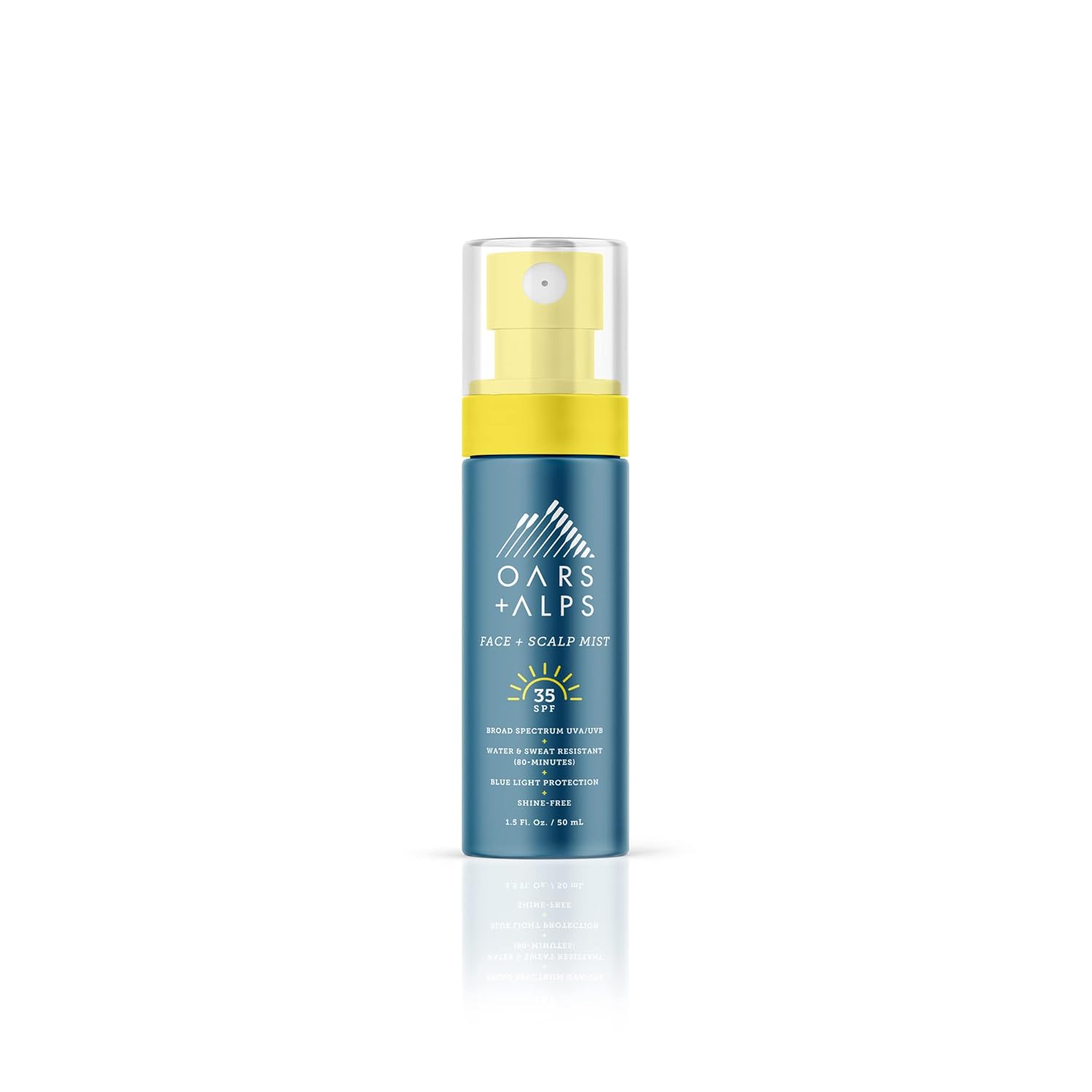
Applying the typical SPF-smelling, intense spray directly to your face is never a fun situation, and to be frank, not the best for your lungs. That said, there's something about the convenience of a spray that makes it easy to reapply (which is something you should be doing every two hours). This formula from Oars + Alps solves all those problems with its refreshing facial mist that works like a mid-day pick-me-up spray with its hydrating formula, and gives you another boost of SPF 35 in the meantime.
What I Love: Perfect for travel and on the go; Contains soothing and hydrating aloe; An ultra-fine mist, not spray
What I Don't: Contains fragrance, so those with sensitive or acne-prone skin may experience irritation
SPF: 35
Type: Chemical
Broad Spectrum Protection? Yes
Customer Review: "This stuff is amazing! Smells fantastic, easy and thorough application, and doesn’t make me feel like I’m 'caked' in sunscreen, which I hate. I have issues with the feel of sunscreen on my skin, and thus it was a game changer for me!" — Amazon
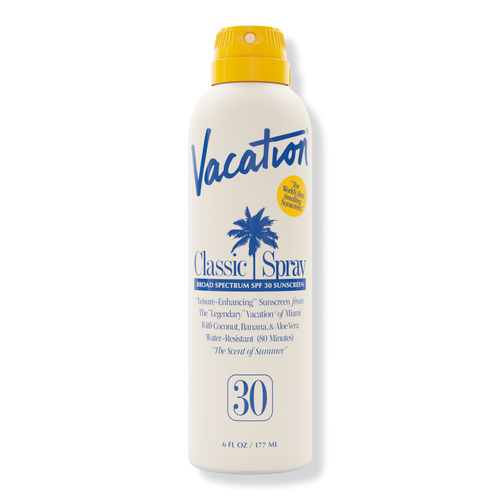
First things first: this SPF smells like heaven—and that’s not an exaggeration. Delicious coconut scent aside, the formula is a winner. It’s going to protect you from UVA and UVB rays, while also soothing and hydrating your body thanks to ingredients like aloe vera, shea butter, and antioxidants.
What I Love: Non-aerosol, continuous mist; Humectants pull in water while emollients trap it in for ultra-smooth skin
What I Don't: Testers report that if you don't rub it in quickly enough, it can pill
SPF: 30
Type: Chemical
Broad Spectrum Protection? Yes
Customer Review: "As a product tester and review writer of 5 years with over 20 years in the beauty industry, I've come across a lot of sunscreens and have seen them evolve over the years. Vacation Inc. is a company that is the embodiment of retro! This sunscreen is a spray, and I love that the top twists to lock and unlock for safety and easy use. It's got an SPF 30, which is very good and is highly effective when out in the sun for a lengthy period of time. Even a day at the beach, this would be my go-to product to have with me." — Ulta
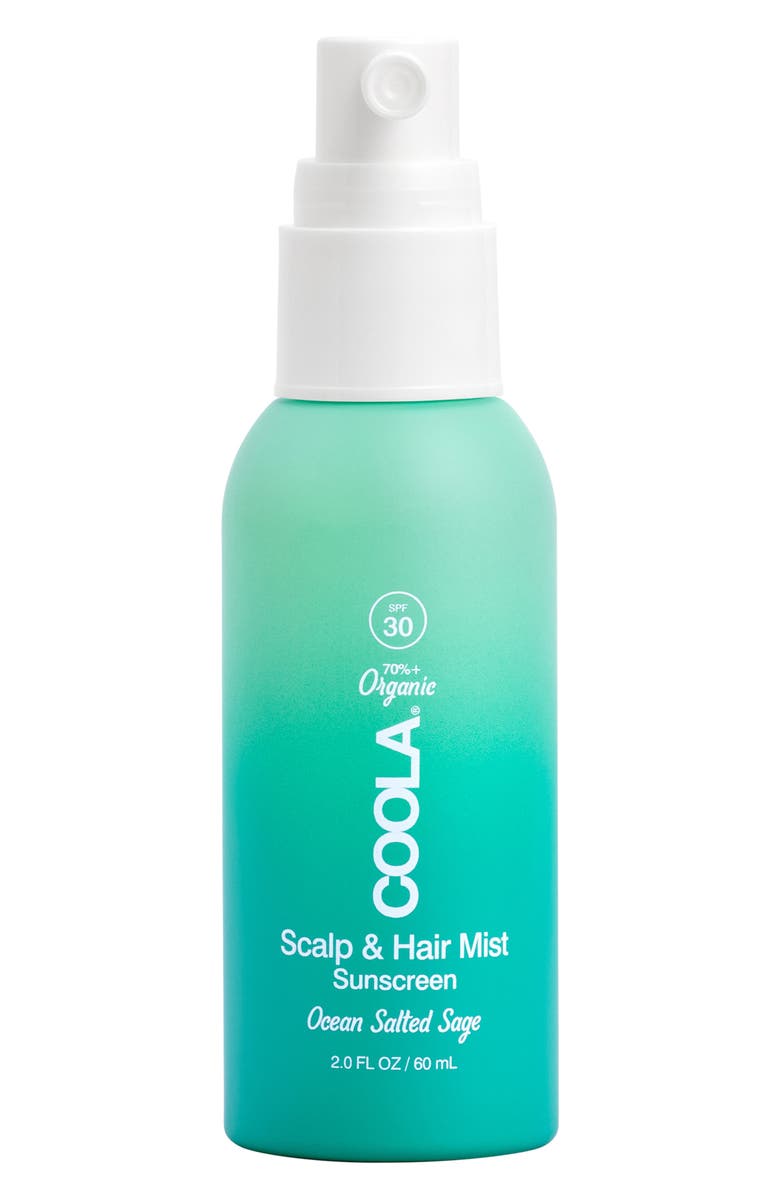
Not-so-fun fact: One of the most commonly missed places on our bodies when it comes to SPF application is the scalp, and particularly the exposed part, which means it's an area that is extra prone to skin cancer. And with typical sunscreen formulas leaving a greasier sheen that's better meant for your skin, it's easy to see why most people aren't diligent about applying it to their hair. Coola's SPF 30 Scalp and Hair Mist takes all those issues out of the equation with its lightweight (yet hydrating) formula that was designed for the easy-to-miss spot.
What I Love: Prevents UV-related hair color fading; Sea salt scent is similar to sea salt sprays; Contains targeted nozzle for easy application to the part
What I Don't: Because it's a spray, it will leave a bit of shine, so if you prefer a matte formula, opt for a powder sunscreen
SPF: 30
Type: Chemical
Broad Spectrum Protection? Yes
Customer Review: "Coola's scalp and hair mist sunscreen is very impressive! The SPF 30 protection is essential, and the inclusion of cica and monoi oil makes it feel truly nourishing. The scent? Light, clean, and absolutely delicious – a subtle, refreshing fragrance that doesn't overwhelm. I love that it's vegan, gluten-free, and organic; those details matter to me. The spray bottle makes application incredibly easy, and the mist is fine and even. Best of all, it leaves my scalp and hair feeling clean and refreshed, never greasy or weighed down. " — Nordstrom
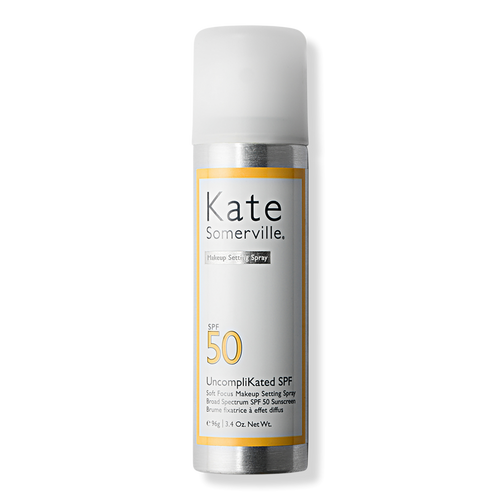
If you're looking for a two-in-one, this double-duty formula acts as an SPF and matte-finishing makeup spray. That's right—this spray will keep your makeup in place and add a soft, blurred finish for a long-lasting look. We’re not the only ones that love this formula—it’s also Dr. Zubritsky’s fave.
What I Love: Super fine mist; Doesn't apply greasy, so it won't mess up makeup; Contains powder to provide a blurring, soft effect; Travel-friendly
What I Don't: Pull your hair back or it can leave a bit of residue when applying
SPF: 50
Type: Chemical
Broad Spectrum Protection? Yes
Customer Review: "This is the most incredible setting spray I have ever used ever!! It really is blurring. A lot of products claim to be, but this one actually is. It's an incredible setting spray that keeps your makeup in place for 12 hours with a soft, dewy glow. It's amazing. AND IT'S A SUNSCREEN!! I will never use anything other than this product, and it smells of soft lavender. Simply divine!!!" — Ulta
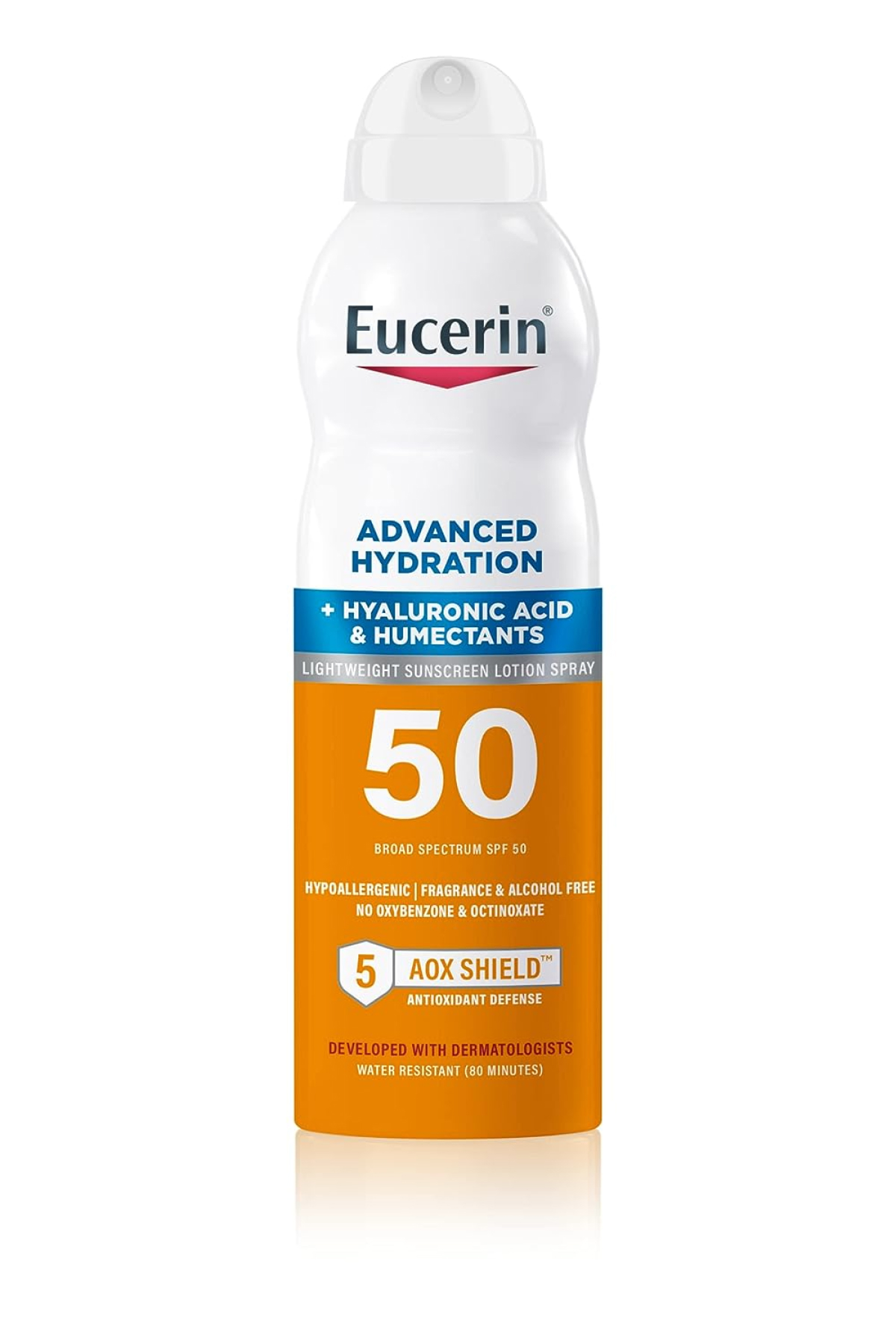
While this sunscreen applies conveniently through a spray, it feels just like an ultra-hydrating lotion without any leftover greasiness. The formula is filled with superstar ingredient hyaluronic acid, which pulls moisture into the skin, alongside vitamins E and C for brightening and protecting effects.
What I Love: Hyaluronic acid keeps skin plump; Invisible finish; Fragrance and alcohol free
What I Don't: Pretty thick formula that requires a bit of extra rubbing in
SPF: 50
Type: Chemical
Broad Spectrum Protection? Yes
Customer Review: "First and foremost, the spray format of this sunscreen lotion is a game-changer. It allows for effortless and even application, ensuring that every part of my body is adequately protected. The fine mist provides a lightweight and non-greasy coverage, which is a refreshing departure from traditional lotions that can feel heavy and sticky on the skin. Just because of this, I feel more diligent about putting sunscreen on which is so important" — Amazon
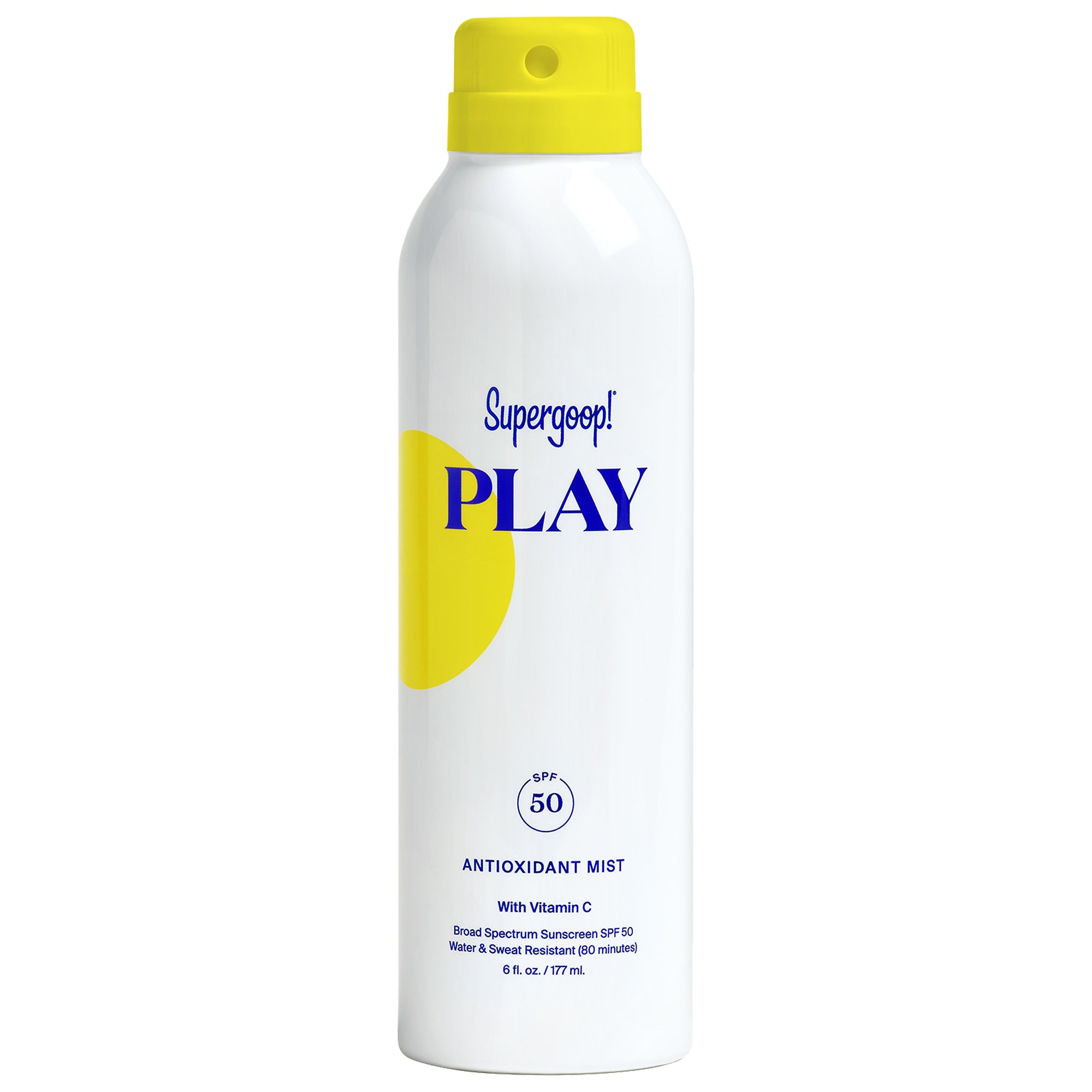
Dr. Zubritsky loves this SPF “because it contains antioxidants like Vitamin C for extra protection.” She says it’s ideal for all the summer activities (read: hiking, swimming, sports) because it’s water resistant. While you should reapply your sunscreen every two hours, it’s best to lather up after 80 minutes if you’re sweating or decide to go for a dip.
What I Love: Non-aerosol; Green tea extract contains polyphenols, which act as extra protection against the sun
What I Don't: Has a bit of a greasy texture
SPF: 50
Type: Chemical
Broad Spectrum Protection? Yes
Customer Review: "I took this on vacation to Curacao, and I was very happy with the results. I tend to burn after about 10-15 minutes in the Ohio sun, so I was a bit worried about being too close to the equator! I used this on a daily basis and did not get burned. My skin felt soft, and the smell was really nice." — Sephora
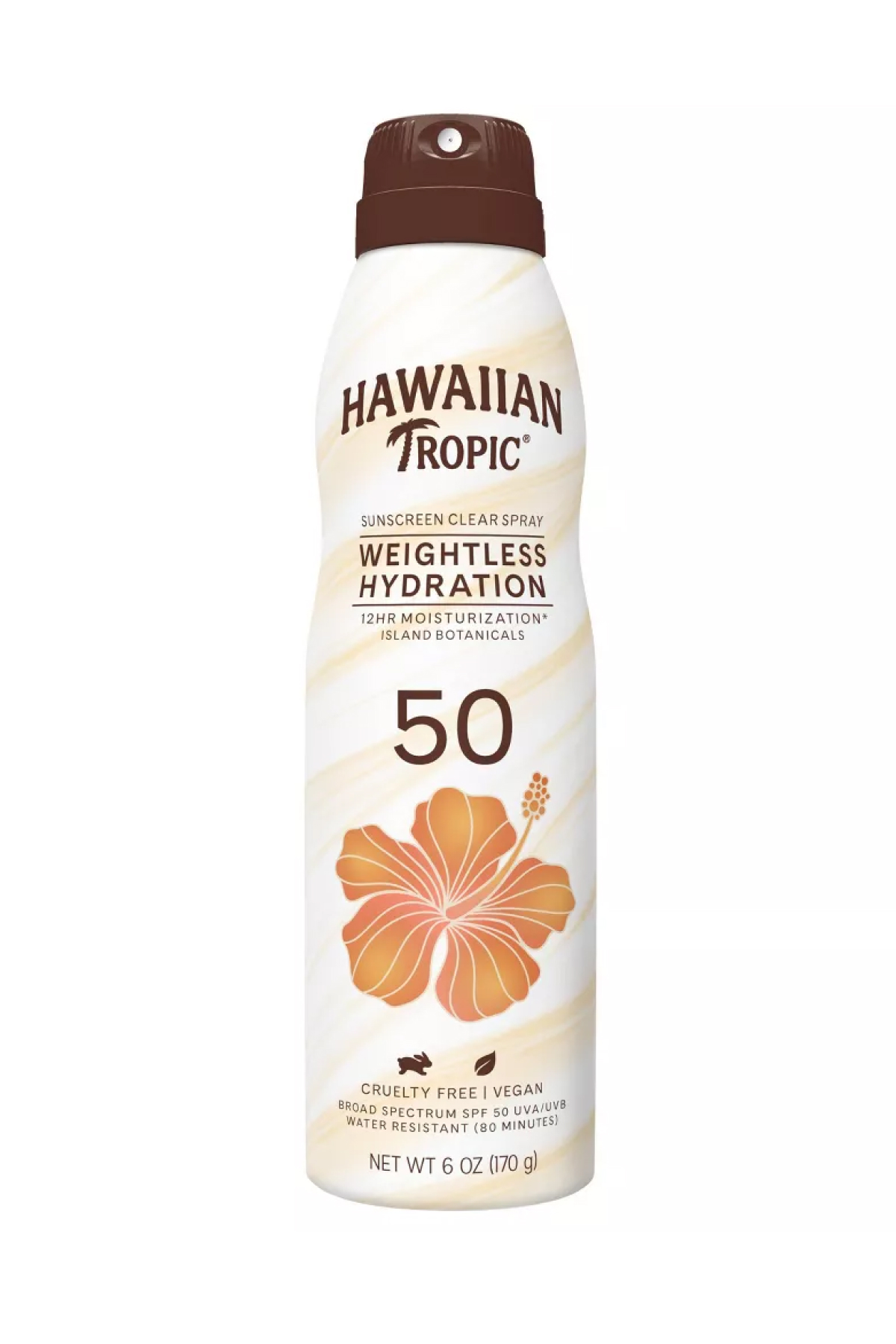
When I'm on vacation, I want to smell like I'm on vacation. Think: coconuts and the salty ocean breeze. This sunscreen perfectly captures that scent, while also providing a weightless feel with a non-greasy residue. It also contains antioxidants for extra protective properties and aloe vera to soothe the skin. For only $13, it's my favorite SPF to stock up on before heading on a vacation.
What I Love: Affordable price tag and available at local drugstores; Contains skin-soothing aloe vera
What I Don't: Can feel tacky when first applied before it dries down
SPF: 30
Type: Chemical
Broad Spectrum Protection? Yes
Customer Review: "This has been my go-to daily SPF. Not just for the beach or park, but literally every morning when I want easy SPF on my neck and arms without getting my hands greasy. Smells great and dries quickly without feeling greasy." — Target
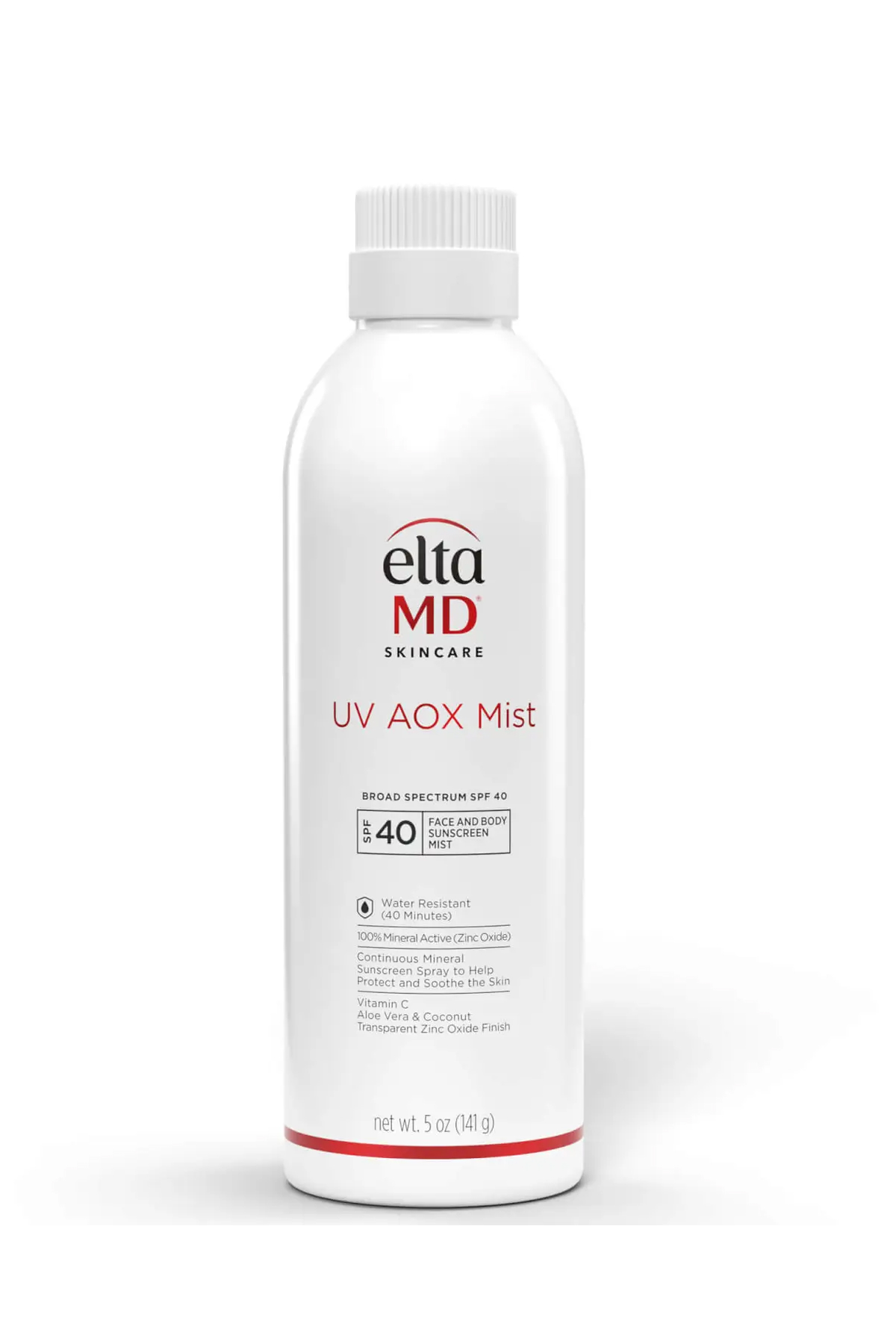
I'm sure you know and love EltaMD's cult-favorite UV Clear sunscreen, and I'm here to tell you this spray version is just as good. While this ultra-fine mist sprays out white (a bonus for being able to see exactly where you apply), it absorbs into skin in seconds with a completely clear finish—no white cast or streaks in sight! The formula is also jam-packed with antioxidants to fight anti-aging. A win-win!
What I Love: Has a slight white application so you can see where it's applied, but dries completely clear; 360-degree sprayability so it always works, despite how you hold the bottle
What I Don't: Sometimes the nozzle gets clogged and you'll have to wipe it off
SPF: 40
Type: Mineral
Broad Spectrum Protection? Yes
Customer Review: "Every other mineral spray I've tried has been thick, hard to rub in, and clogs the sprayer often. Not this one! Sprays on white so you can see it, but rubs in clear easily and washes off at the end of the day with no extra effort. " — Dermstore
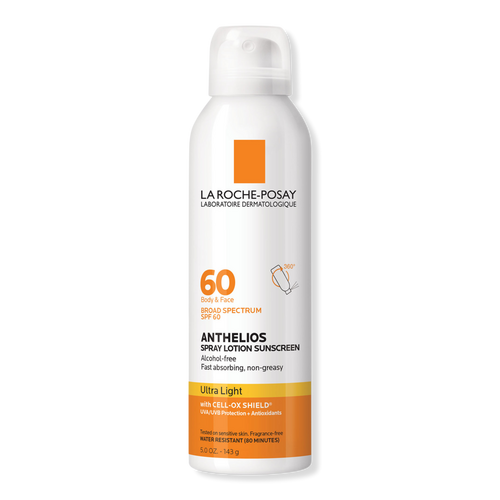
Making sure that little kids are protected from the sun is tough. Trying to coat them in a cream? Near impossible. But with a spray like this La Roche-Posay option, it’s a heck of a lot easier. We love this formula because it’s water resistant, offers antioxidant protection, and leaves a silky finish.
What I Love: Feels ultra-light, like there's nothing on the skin; 360-degree spray nozzle so it works however the bottle is held
What I Don't: Best for body, not particularly for face
SPF: 60
Type: Chemical
Broad Spectrum Protection? Yes
Customer Review: "The only sunscreen my sunscreen-averse husband will use. He finds it convenient to spray (his face, bald head, body, everywhere), it absorbs quickly when rubbed in, and it is the most effective one at preventing burns of the many we have tried." — Ulta
How to Apply Spray Sunscreen
“When using sunscreen, I recommend applying at least one ounce of sunscreen to the entire body—this is the equivalent of a shot glass,” says Dr. Zubritsky. “This can be hard to determine using a spray-on sunscreen, so a good rule of thumb is to apply the spray until the skin glistens.”
You’ll want to keep the bottle close to the skin (no more than a six-inch distance) and rub the product in. For reference, a standard-size bottle of spray sunscreen should last only six body applications. Let that sink in: one bottle is worth only six body applications.
Is Spray Sunscreen Safe?
A few years ago, Johnson & Johnson recalled some of its sunscreens after detecting low amounts of benzene, a known carcinogen, in certain aerosol formulas. According to board-certified dermatologist Hadley King, M.D., "We still don't know how effectively benzene penetrates through the skin, or how the benzene behaves after skin penetration," because most research has looked at what happens when it's inhaled or ingested, not applied to the skin.
Inhaling benzene can be harmful to the lungs, says Dr. King. And research suggests contamination may stem from isobutane, a propellant used in aerosol sprays, she adds. If you prefer sprays, she suggests looking for non-aerosol options, applying them outside or in a well-ventilated space, and holding your breath for a few seconds while spraying. At the end of the day, "avoiding an effective preventative measure such as sunscreen could prove more harmful than exposure to trace amounts of benzene," Dr. King says.
What's The Difference Between Chemical and Mineral Sunscreens?
If you prefer spray sunscreens over other formulas, you'll have to decide whether to use chemical or mineral sunscreens, with each having its own pros and cons. Here, Dr. King breaks down the difference between the UV filters and gives her recommendations for each.
- Chemical sunscreens
Chemical sunscreens absorb UV rays and convert them into heat, which is then released from the skin, says Dr. King. These formulas typically contain UV filters like oxybenzone, octinoxate, homosalate, octisalate, octocrylene, and avobenzone. Chemical formulas tend to be sheerer and lighter than mineral options, making them a great choice for deeper skin tones, since they're less likely to leave a white cast.
- Mineral or physical sunscreens
Mineral sunscreens (also known as physical sunscreens) use zinc oxide and/or titanium dioxide to create a barrier on the skin that reflects UV rays. Dr. King recommends these formulas for people with sensitive or acne-prone skin, since they're less likely to cause irritation. They're also photostable, meaning they don't break down when exposed to sunlight.
Why Trust Marie Claire?
For more than 30 years, Marie Claire has been an internationally recognized destination for news, fashion and beauty trends, investigative packages, and more. When it comes to the products Marie Claire recommends, we take your faith in us seriously. Every product that we feature comes personally recommended by a Marie Claire writer or editor, or by an expert we’ve spoken to firsthand.
How We Tested
Marie Claire is an authority on sunscreen, having written countless stories about must-have SPF formulas, such as the best sunscreens overall and the best body sunscreens, among others. The products on this list have all been tried and tested by one of our editors or hand-picked by beauty writers after testing the product over a few weeks.
While the best spray sunscreen for you will vary based on personal preference, you truly can't go wrong with one of the items on this list.
Meet the Experts

Lindsey Zubritsky, M.D., is a board-certified dermatologist at Premier Dermatology and Skin Cancer Center in Mississippi, where she specializes in general, surgical, cosmetic, and pediatric dermatology. A Fellow of the American Academy of Dermatology and one of its official social media ambassadors, Dr. Zubritsky is passionate about debunking skincare myths and educating the public through her digital platforms.
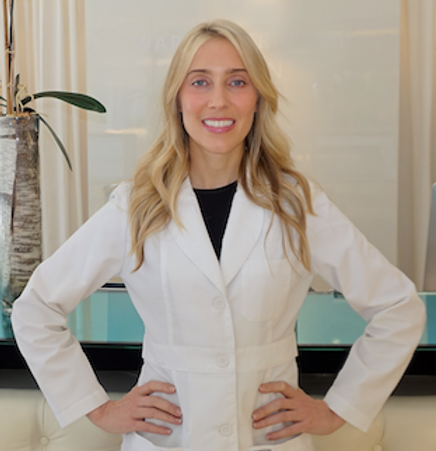
Hadley King, M.D., is a board-certified dermatologist who specializes in medical and cosmetic dermatology. She is also a Clinical Instructor of Dermatology at the Weill Medical College of Cornell University.
After residency, Dr. King worked as an attending physician at Memorial Sloan-Kettering Cancer Center, during which time she specialized in cutaneous oncology and photodynamic therapy. She also has a background in immunology, and her research has been published in a variety of medical journals, including the Journal of the American Medical Association.
Get exclusive access to fashion and beauty trends, hot-off-the-press celebrity news, and more.

Siena Gagliano is the Beauty Editor at Marie Claire, where she writes and edits reported features, trend stories, and expert-backed shopping roundups. Before joining the team full-time, she was an editor at Cosmopolitan, where she specialized in SEO-first beauty content and commerce strategy. Her bylines have also appeared in Allure, ELLE, Bustle, Well+Good, Popsugar, and Women's Health, covering everything from the best products for brighter, glowier skin to the science behind face mapping. Curious about the behind-the-scenes magazine life and her go-to beauty picks? Follow her on Instagram at @sienagagliano.
- Samantha HolenderSenior Beauty Editor
- Brooke KnappenbergerAssociate Commerce Editor